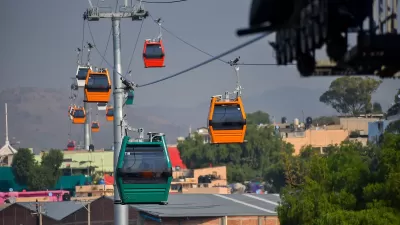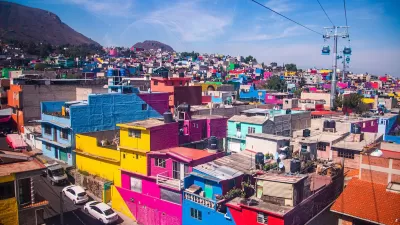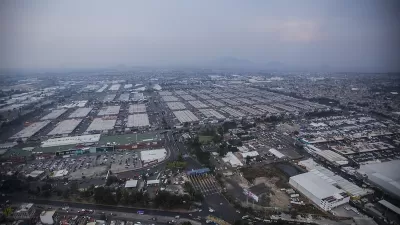Noah Kazis considers three success stories for public space in Mexico City, taking streets back from both automobiles and – believe it or not – street vendors.
Authorities in Mexico City have given three streets a major facelift, closing off traffic to cars and handing street life back to pedestrians.
The first, Calle Regina, had bigger problems to deal with than vehicular traffic. The street was crowded with vendors that, according to authorities, were affiliated with gangs. "As the administration of Mayor Marcelo Ebrard cleared the area, authorities found caches of drugs and guns," writes Kazis. "Different colored tarps announced which gangs protected each vendor. Only after removing the vendors could officials turn their attention to making Calle Regina car free."
Nearer the zócalo, or public square, on Calle Francisco I. Madero, the City's Public Space Authority faced a different challenge: business owners concerned that restricting traffic would cut into business. The Authority's head, Daniel Escotto, pleaded with the local chamber of commerce: "Let me just have one day, with cones," he recalls. When the program began, Calle Madero was closed once a week, on Mondays. Within two weeks, it was Tuesdays, too. Just three months later, the street was repaved to eliminate its curbs, in a gesture of commitment to its new, pedestrian-only status.
Lastly, to celebrate the bicentennial of the Mexican Revolution, officials approved pedestrian-friendly improvements to the monumental Plaza de la República. "Sidewalks were widened and beautified with new street furniture and plantings. Plaza space once given over to car parking was reclaimed, creating room for amenities like a new fountain."
The next step, according to Escotto, is to remove all four lanes of vehicular traffic surrounding the Plaza by the end of 2012, dedicating the space exclusively to pedestrians.
FULL STORY: How Mexico City Fought and Cajoled to Reclaim Streets for Pedestrians

Alabama: Trump Terminates Settlements for Black Communities Harmed By Raw Sewage
Trump deemed the landmark civil rights agreement “illegal DEI and environmental justice policy.”

Study: Maui’s Plan to Convert Vacation Rentals to Long-Term Housing Could Cause Nearly $1 Billion Economic Loss
The plan would reduce visitor accommodation by 25% resulting in 1,900 jobs lost.

Planetizen Federal Action Tracker
A weekly monitor of how Trump’s orders and actions are impacting planners and planning in America.

Wind Energy on the Rise Despite Federal Policy Reversal
The Trump administration is revoking federal support for renewable energy, but demand for new projects continues unabated.

Passengers Flock to Caltrain After Electrification
The new electric trains are running faster and more reliably, leading to strong ridership growth on the Bay Area rail system.

Texas Churches Rally Behind ‘Yes in God’s Back Yard’ Legislation
Religious leaders want the state to reduce zoning regulations to streamline leasing church-owned land to housing developers.
Urban Design for Planners 1: Software Tools
This six-course series explores essential urban design concepts using open source software and equips planners with the tools they need to participate fully in the urban design process.
Planning for Universal Design
Learn the tools for implementing Universal Design in planning regulations.
Caltrans
Smith Gee Studio
Institute for Housing and Urban Development Studies (IHS)
City of Grandview
Harvard GSD Executive Education
Toledo-Lucas County Plan Commissions
Salt Lake City
NYU Wagner Graduate School of Public Service





























